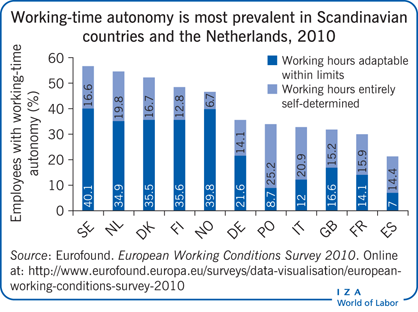Elevator pitch
Allowing workers to control their work hours (working-time autonomy) is a controversial policy for worker empowerment, with concerns that range from increased shirking to excessive intensification of work. Empirical evidence, however, supports neither view. Recent studies find that working-time autonomy improves individual and firm performance without promoting overload or exhaustion from work. However, if working-time autonomy is incorporated into a system of family-friendly workplace practices, firms may benefit from the trade-off between (more) fringe benefits and (lower) wages but not from increased productivity.

Key findings
Pros
Working-time autonomy promotes worker and firm performance.
Performance is particularly improved if autonomy is reserved for intrinsically motivated workers or if workers self-select into working time arrangements.
By lowering employee turnover, working-time autonomy enables firms to improve their attractiveness as an employer.
If working-time autonomy is incorporated into a system of family-friendly workplace practices, firms might benefit from reduced turnover and wage costs.
Despite its effort-increasing effect, working-time autonomy is unlikely to promote overload or exhaustion from work.
Cons
Some workers might abuse working-time autonomy by reducing their work effort, since an absence of direct monitoring reduces employees’ shirking costs.
If it is part of a corporate strategy to reduce costs, working-time autonomy is detrimental to firm performance.
Working-time autonomy might not be suited to employees who execute routine tasks.
Working-time autonomy is inappropriate for certain occupational groups and hard to implement in teamwork environments.
Firm productivity might not increase if working-time autonomy is incorporated into a system of family-friendly workplace practices.